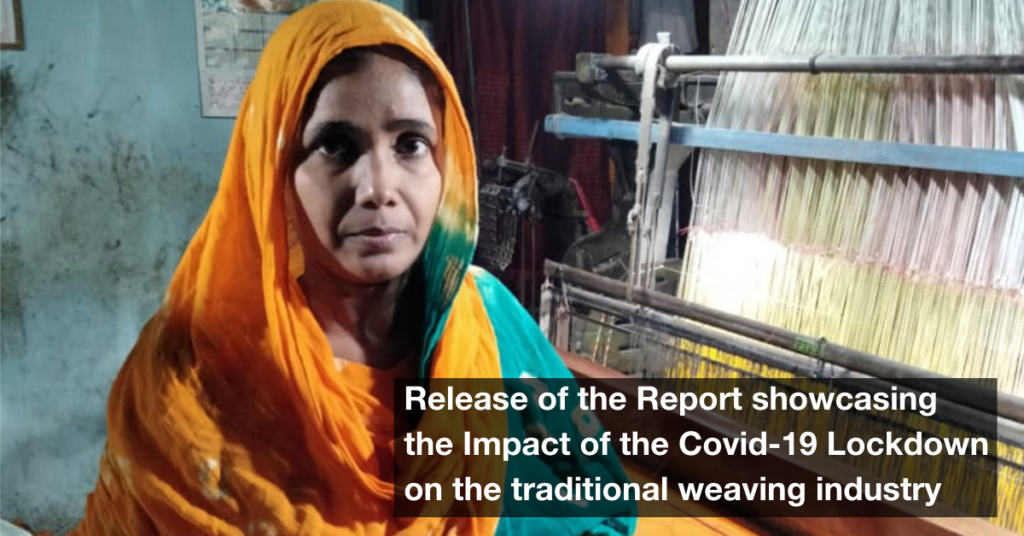
Curtain raiser: The Warp and Weft of Despair in Purvanchal CJP’s fact-finding report on the impact of the Covid-19 Lockdown on the traditional weaving industry
31, Jan 2022 | CJP Team
After the sudden Lockdown, announced in wake of the outbreak of Covid-19 in 2020, threw lives and livelihoods of people completely out of gear, Citizens for Justice and Peace (CJP) undertook a fact-finding mission to ascertain the impact of the Lockdown on the traditional Banarasi weaving industry in Purvanchal (Eastern Uttar Pradesh).
For centuries this region has represented India’s diversity and communal harmony via its own unique syncretic culture – the Ganga Jamuni Tehzeeb. The Banarasi weaving industry has, through the ages, helped weave together both Hindus and Muslims in a rich cultural tapestry, forging strong bonds between people from both communities. But decades of bad policies, growing communalism and then the sudden Lockdown in wake of the Covid-19 pandemic, have pushed the once thriving industry to the edge of doom. Th estimated loss stands at a staggering Rs 3,000 crores!
Today, we are releasing our report titled Purvanchal: Silence of the Looms, which is based on an on-ground fact-finding survey carried out across four districts in Eastern Uttar Pradesh that have a huge population of people engaged in weaving the famous Banarasi fabric and allied activities.
Our 17-member survey team led by Dr. Muniza Khan, Varanasi-based social science researcher, conducted detailed interviews of 204 respondents, 37 video interviews and 19 audio-interviews in: Varanasi (13 locations), Gorakhpur (Rasoolpur, Purana Gorakhnath), Azamgarh (Mubarakpur, Ibrahimpur, Shahpur) and Mau (Ghosi, Madhuban). The entire exercise was spread over several months in 2020-21.
This study is unique because though many other studies have been conducted to ascertain the impact of Covid, most were conducted remotely. But out team did all its research on the ground – in the homes and workplaces of the respondents. The team took all necessary precautions, including wearing masks, using sanitisers and maintainingsocial distancing, while conducting the physical survey amidst the Covid-19 pandemic.
Another unique feature of our fact-finding mission was to look at the plight of weavers through an intersectional lens. Therefore, we have examined the plight of women in the industry – those who are weavers, as well as those who are engaged in allied activities like embroidery, stone application, spool threading, saree cutting, polishing and finishing etc. To our shock, most women engaged in allied activities were unpaid as the work they did was considered a part of their daily household chores! These women also experienced varying degrees of malnutrition and allied health problems as well as domestic abuse. Our report also looks at growing communalism as well as impact on weavers hailing from historically oppressed castes and communities.
The report will be released online in a ceremony attended by several textile industry leaders and scholars. While CJP secretary Teesta Setalvad will host the online event, special guests and speakers include:
- Laila Tyabji (Social worker, textile expert and craft activist; one of the founders of Dastkar)
- SyamaSundari (Textile expert; also coordinator, policy research and advocacy, Dastkar Andhra)
- Vasanthi Raman (Scholar and Textile industry expert)
- Muniza Khan (Social Scientist and Activist)
- Quaiser Jahan (Woman Weaver, Saraiya, Varanasi)
Join us at 11: 30 AM at: https://us02web.zoom.us/j/
Meeting ID: 899 3960 6929
Passcode: 226184
Related:
Lockdown Impact: Filled forms, have Bunkar Card, yet got no help from gov’t
Lockdown impact: Religion-based discrimination rampant in Varanasi?
Lockdown impact: Unemployed fathers, abused mothers and daughters deprived of education










